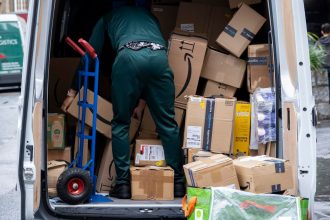Unlock the Editor’s Digest for free
Roula Khalaf, Editor of the FT, selects her favourite stories in this weekly newsletter.
Explosions and fires ripped through a camp for displaced persons in Rafah late on Sunday after what authorities in Gaza said were Israeli air strikes.
Local health officials said at least 35 people had been killed and dozens more injured.
The Israeli military said it had struck a “Hamas compound” in Rafah at approximately the same time, but that it was looking into the specific incident at a UN-run “safe zone” in the city’s north-western Tal as-Sultan neighbourhood.
It said two senior Hamas figures had been killed in its strike on Tal as-Sultan — naming them as Yassin Rabia and Khaled Nagar, two commanders responsible for the group’s militant operations in the West Bank.
Palestinian eyewitnesses and videos on social media showed fires raging through makeshift tents while survivors tried in vain to extricate those caught in the flames.
Earlier in the day the Palestinian militant group fired long-range rockets at central Israel for the first time in months, including past Tel Aviv, in a demonstration of the capability it retains.
Eight rockets were fired from Rafah, less than a kilometre from advancing Israeli troops, in a move that Daniel Hagari, chief spokesman for the Israel Defense Forces, attributed to Hamas’s fears for their weapons stocks.
Israeli officials have described Rafah, Gaza’s southernmost city, as the last stronghold for the group in the territory and earlier this month launched a major air and ground assault on the area.
About 1.2mn people took shelter in Rafah from Israeli attacks elsewhere in the Gaza Strip after Hamas’s October 7 assault on Israel triggered the ongoing war.
At least 800,000 of those had already fled to areas north of Rafah as the Israeli offensive deepened in recent weeks, according to the UN.
They have travelled to places that are designated “safe zones” but which lack basic services such as clean water and medical care, according to international aid groups.
Egypt and Israel were in talks on Sunday to resume aid deliveries to Gaza via the strip’s southern Rafah crossing as Israel pressed on with its military operations in the area despite an order to halt from the International Court of Justice.
The ICJ on Friday described conditions for those Palestinians still sheltering in Rafah as “disastrous”.
Israel has rejected the UN court’s call for it to cease military operations in Rafah. The bench also ordered Israel to reopen the Rafah crossing to Egypt for direly needed aid, as Gazans struggle with acute shortages of food and other necessities.
The humanitarian situation for Gazans has become a point of contention between Israel and its allies, including the US, as well as playing a role in the court’s decision to order Israel to take fresh interim measures.
On Sunday, the supply of aid from Egypt to Gaza resumed, but only via the separate Kerem Shalom crossing from Israel. Aid from Egypt had been halted for several weeks following Israel’s seizure of the Gaza side of the Rafah crossing earlier this month, and Cairo’s angry reaction to the offensive.
More than 120 Egyptian aid trucks crossed via Kerem Shalom into Gaza on Sunday, said Israeli military officials, after US President Joe Biden spoke on Friday with Egyptian President Abdel Fattah al-Sisi in an attempt to ease tensions.
The White House said talks were ongoing to “reopen the Rafah crossing with arrangements acceptable to both Egypt and Israel”, a move that would require the tactical redeployment of IDF personnel in the area, said an Israeli official.
Josep Borrell, the EU’s chief diplomat, on Sunday said the situation in Gaza was “beyond words” as he spoke in Brussels alongside Palestinian Prime Minister Mohammad Mustafa.
The Israeli military claimed on Sunday that aid entering Gaza had doubled from the previous week, and that supplies had included 300,000 litres of fuel to run essential services at shelters and hospitals.
Israeli Prime Minister Benjamin Netanyahu has rejected calls for a halt to Israel’s offensive. He has also rebutted accusations of war crimes from the prosecutor of the International Criminal Court, who last week requested arrest warrants against him and his defence minister.
Netanyahu maintains that his country’s forces will pursue “total victory” against Hamas.
Israeli forces have in recent days taken control of more than 70 per cent of Gaza’s frontier with Egypt, known as the Philadelphi corridor, and have pushed deeper into Rafah including the al-Shaboura refugee camp, according to Israeli military analysts.
Israeli officials insist military action in Rafah is needed to eliminate the last four standing Hamas battalions and sever the group’s access to smuggling routes from Egypt.
Israeli special forces have in recent weeks also retrieved the bodies of six hostages held by Hamas since October 7. According to Israeli officials, 125 Israeli and foreign nationals are still being held in Gaza, with 39 confirmed dead.
Negotiations for their release as part of a ceasefire deal tentatively resumed at the weekend in Paris as the head of Israel’s Mossad, David Barnea, met CIA chief Bill Burns and Qatar’s prime minister Sheikh Mohammed bin Abdulrahman al-Thani.
Additional reporting by Henry Foy
Read the full article here




